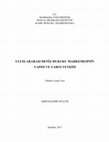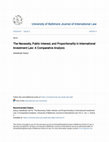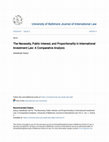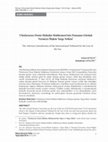Books by Abdulkadir GÜLÇÜR

International Tribunal for the Law of the Sea was established under 1982 United Nations Conventio... more International Tribunal for the Law of the Sea was established under 1982 United Nations Convention on the Law of the Sea Annex VI which is Statute of Tribunal, and it has been running since 1996 as a specialized international judicial authority on the law of the sea. In the Tribunal as a whole, the representation of the principal legal systems of the world and equitable geographical distribution is assured. Disputes arising from the interpretation or application of Convention are within the scope of tribunal’s jurisdiction with the other judicial authorities listed under article 287. The Tribunal has made significant contributions to the international law of the sea especially for the release of detained vessels and crews under the article 292 and prescribing provisional measures pending a constitution of an arbitral tribunal under the article 290. However, in recent years, the diversity of cases in which the Tribunal has examined, has increased. In this context, different disputes have come before the Tribunal under the different sub-headings of the law of the sea, such as navigation freedom, delimitation of maritime zones and jurisdiction of the state in maritime zones. This fact gives significant clues as to the Tribunal's perfection in the law of the sea will rise to a higher level in the coming years. One of the essential topics which the Tribunal made contributions to the law of the sea in accordance with the Convention is the “ship as a unit” concept. In addition, the "considerations of humanity" principle, which was used by the International Court of Justice for the first time in the Corfu Channel case, has used by several times by the Tribunal and revived. Besides of the “considerations of humanity” principle, other principles such as “due process of law” have been used by the Tribunal. Last but not least, there is a special importance of the Convention be considered as a “living instrument” by the Tribunal.
Papers by Abdulkadir GÜLÇÜR

ULUSLARARASI DENİZ HUKUKU MAHKEMESİNİN YAPISI VE YARGI YETKİSİ Uluslararası Deniz Hukuku Mahkemes... more ULUSLARARASI DENİZ HUKUKU MAHKEMESİNİN YAPISI VE YARGI YETKİSİ Uluslararası Deniz Hukuku Mahkemesi, 1982 Birleşmiş Milletler Deniz Hukuku Sözleşmesi’nin VI numaralı Eki uyarınca Statüsü oluşturularak, 1996 yılında faaliyete geçen deniz hukuku alanında uzmanlaşmış uluslararası bir yargı mercidir. Mahkeme üyeliklerinin dağılımında dünyanın başlıca hukuk sistemlerinin temsili ve adil coğrafi dağılımın sağlanması amaçlanmaktadır. Sözleşme’nin yorumlanması veya uygulanmasından doğan uyuşmazlıklar, madde 287 uyarınca sayılan diğer yargı mercileri ile birlikte Mahkeme’nin yargı yetkisi kapsamındadır. Sözleşme madde 292 çerçevesinde makul kefalet yatırılması üzerine alıkonmuş gemi ve mürettebatının derhal serbest bırakılması ve madde 290 çerçevesinde tahkim mahkemesinin teşekkülünü beklerken geçici tedbirlerin emredilmesi hususlarında, Mahkeme’nin vermiş olduğu kararlar, deniz hukukuna önemli katkılar sağlamıştır. ABSTRACT THE COMPOSITION AND THE JURISDICTION OF THE INTERNATIONAL TRIBUNAL F...
Marmara Üniversitesi Hukuk Fakültesi Hukuk Araştırmaları Dergisi, 2018
Marmara Üniversitesi Hukuk Fakültesi Hukuk Araştırmaları Dergisi, 2018
Marmara Üniversitesi Hukuk Fakültesi Hukuk Araştırmaları Dergisi, 2019
Birleşmiş Milletler'in kurulması ve ardından kabul edilen uluslararası belgeler ile uluslararası ... more Birleşmiş Milletler'in kurulması ve ardından kabul edilen uluslararası belgeler ile uluslararası hukuk önemli bir değişim yaşamıştır. Eş zamanlı olarak küreselleşme kavramı altında değerlendirilen gelişmeler, kabul edilen uluslararası kurallar ile birlikte devletlerin mutlak egemenlik sınırlarının silikleşmesi yönünde dramatik bir dönüşümün fitilini ateşlemiştir. Bu durumun meydana gelmesinde, uluslararası hukukta daha önce yalnızca devletler arasında ulusal menfaatler üzerinden yürüyen karşılıklı ilişkilerin, uluslararası toplumun ortak menfaatlerini kapsayacak şekilde genişlemesi ve bununla bağlantılı olarak uluslararası hukukun öznelerinin yalnızca devletler olmaktan çıkarak, uluslararası örgütlerin, devlet-dışı aktörlerin ve bireylerin de sisteme dahil olması etkili olmuştur.

This article deals with relations of the three concepts of international investment law which can... more This article deals with relations of the three concepts of international investment law which can be enumerated as “necessity,” “public interest,” and “proportionality.” These three concepts have been reviewed in the light of the relevant investment tribunals’ decisions and judgments of other international judicial bodies. In democratic governments, legal acts and actions must be based on the “public interest.” However, the “public interest” does not constitute by itself a determinative factor for lawfulness. The proportionality principle has a significant role in the investment arbitrations concerning whether the “public interest” aim is met. Albeit those inferences, the “public interest” claim is not a magic key which opens all doors. Because even if such a claim is asserted, it will be insufficient when some governmental actions are pursued to protect vital interests of the State. Hence, “state of necessity” always has been retained on the agenda of international law. Therefore, ...
Marmara Üniversitesi Hukuk Fakültesi Hukuk Araştırmaları Dergisi
Marmara Üniversitesi Hukuk Fakültesi Hukuk Araştırmaları Dergisi

University of Baltimore Journal of International Law , 2019
This article deals with relations of the three concepts of international investment law which can... more This article deals with relations of the three concepts of international investment law which can be enumerated as “necessity,”
“public interest,” and “proportionality.” These three concepts have
been reviewed in light of the relevant investment tribunals’ decisions and judgments of other international judicial bodies. In democratic governments, legal acts and actions must be based on the
“public interest.” However, the “public interest” does not constitute
by itself a determinative factor for lawfulness. The proportionality
principle has a significant role in the investment arbitrations concerning whether the “public interest” aim is met. Albeit those inferences, the “public interest” claim is not a magic key that opens all
doors. Because even if such a claim is asserted, it will be insufficient
when some governmental actions are pursued to protect the vital interests of the State. Hence, “state of necessity” always has been retained on the agenda of international law. Therefore, the customary
law had developed stringent requirements for meeting the conditions
of “necessity.”
Hukuk Araştırmaları Dergisi, 2019
This article aims to unveil various features of provisional measures, especially under the ITLOS ... more This article aims to unveil various features of provisional measures, especially under the ITLOS jurisdiction. The jurisprudence of other international courts and tribunals are very essential to understand how ITLOS deals with a request for provisional measures. Therefore, comparing the jurisdiction and jurisprudence of the ITLOS with other courts and tribunals will help to reveal various aspects of the provisional measures.

Hukuk Araştırmaları Dergisi, 2019
Öz Birleşmiş Milletler'in kurulması ve ardından kabul edilen uluslararası belgeler ile uluslarara... more Öz Birleşmiş Milletler'in kurulması ve ardından kabul edilen uluslararası belgeler ile uluslararası hukuk önemli bir değişim yaşamıştır. Eş zamanlı olarak küreselleşme kavramı altında değerlendirilen gelişmeler, kabul edilen uluslararası kurallar ile birlikte devletlerin mutlak egemenlik sınırlarının silikleşmesi yönünde dramatik bir dönüşümün fitilini ateşlemiştir. Bu durumun meydana gelmesinde, uluslararası hukukta daha önce yalnızca devletler arasında ulusal menfaatler üzerinden yürüyen karşılıklı ilişkilerin, uluslararası toplumun ortak menfaatlerini kapsayacak şekilde genişlemesi ve bununla bağlantılı olarak uluslararası hukukun öznelerinin yalnızca devletler olmaktan çıkarak, uluslararası örgütlerin, devlet-dışı aktörlerin ve bireylerin de sisteme dahil olması etkili olmuştur. Abstract International law has experienced a significant change by the establishment of United Nations and adoption of international instruments, hereafter. Meanwhile, both improvements which considered under the concept of globalization and adopted international rules had pulled the trigger towards the dramatic change regarding the blurring of the absolute sovereignty of states. In the happening of that change, expansion of interstate relations which based on the national interests to covering common interests of the international community and related with that, alongside the states, the international organizations, non-state actors, and individuals as being subjects of the international law have been effective. Bu makale konusunu seçmemde tavsiyeleri ile yol gösteren kıymetli hocam Prof. Dr. Bihterin DİNÇKOL'a teşekkür ederim. Makalenin yazımına ilişkin tüm eksiklikler kuşkusuz tarafıma aittir. ARAŞTIRMA MAKALESİ / RESEARCH ARTICLE
Küresel Bakış Çeviri Hukuk Dergisi, 2018
The Turkish translation of the Provisional Measure Order of the International Court of Justice r... more The Turkish translation of the Provisional Measure Order of the International Court of Justice relating with the Jadhav Case.

Marmara Üniversitesi Hukuk Fakültesi Hukuk Araştırmaları Dergisi, 2018
ÖZ Hukuki kesinlik ilkesi, hukukun üstünlüğünün temel görünümlerinden birisidir. Bu nedenle, " hu... more ÖZ Hukuki kesinlik ilkesi, hukukun üstünlüğünün temel görünümlerinden birisidir. Bu nedenle, " hukukun üstünlüğü " ve " hukuk devleti " bakımından bir ulusal hukuk sisteminde hukuki kesinliğin tesis edilmesi kaçınılmazdır. Bu yazı, Avrupa İnsan Hakları Mahkemesi (AİHM) ile Türk Anayasa Mahkemesi'nin (AYM) hukuki kesinlik yaklaşımları arasındaki farklılıkları ve benzerlikleri ortaya koymayı amaçlamaktadır. Bu sebeple, hukuki kesinliğin uygulamasının daha iyi anlaşılması için her iki Mahkemenin de konuyla ilgili olan davaları incelenmiştir. Söz konusu alandaki güncel vakalar, akademisyenlere ve uygulayıcılara ilkenin kavranması ile ilgili önemli ipuçları vermektedir.
ABSTRACT The principle of legal certainty is one of the fundamental appearances of the rule of law. Therefore, the establishment of legal certainty in a national legal system is inevitable in terms of " the rule of law " and " state of law ". This paper aims to reveal differences and similarities between European Court of Human Rights and the Turkish Constitutional Court regarding their approaches to the legal certainty. For this reason, the cases of both Courts have been reviewed for better understanding the implementation of the legal certainty. Recent cases in that field have given significant clues to the scholars and practitioners for comprehension of the principle.

Marmara Üniversitesi Hukuk Fakültesi Hukuk Araştırmaları Dergisi, 2018
ÖZ 1982 Birleşmiş Milletler Deniz Hukuku Sözleşmesi'nde (BMDHS) ve Sözleşme'nin VI numaralı Ek'i ... more ÖZ 1982 Birleşmiş Milletler Deniz Hukuku Sözleşmesi'nde (BMDHS) ve Sözleşme'nin VI numaralı Ek'i olan Uluslararası Deniz Hukuku Mahkemesi Statüsü'nde yalnızca Deniz Dibi Uyuşmazlıkları Dairesi'nin danışma görüşü verme yetkisinden bahsedilmiştir. Buna karşın, Mahkeme'nin tüm üyelerinin hazır olduğu şekilde, önlerine gelen bir talepte danışma görüşü vermeye yetkili olup olmadıkları uzun süredir tartışılmaktaydı. 27 Mart 2013'te Alt Bölge Balıkçılık Komisyonu tarafından Mahkeme'ye yapılan danışma görüşü başvurusu ile Mahkeme danışma görüşü vermeye yetkili olup olmadığını inceleme fırsatı yakalamıştır. Devletlerin Mahkeme'ye sundukları yazılı beyanlarında iki zıt yaklaşım bulunmasına rağmen, Mahkeme kendisini yetkili görerek yasadışı, bildirilmemiş ve düzenlenmemiş balıkçılık hususunda önemli cevaplar vermiştir. Özellikle yasadışı, bildirilmemiş ve düzenlenmemiş balıkçılık hususunda bayrak devletinin gerekli özen yükümlülükleri ve bu yükümlülüklere aykırı davranışlarının uluslararası sorumluluğa yol açabileceğinin danışma görüşünde belirtilmiş olması önem arz etmektedir.
ABSTRACT The 1982 United Nations Convention on the Law of the Sea (UNCLOS) and Annex VI of Convention which is the Statute of International Tribunal for the Law of the Sea only have provisions about Sea-Bed Disputes Chamber’s advisory jurisdiction. Despite that, there is a long-term debate whether the whole Tribunal able to give an advisory opinion. On March 27, 2013, the Tribunal had the opportunity to examine whether it has jurisdiction to give an advisory opinion for the Sub-Regional Fisheries Commission application. Although there were two opposite approaches in the written statements of states, the Tribunal had recognized its competence and had given answers about illegal, unreported and unregulated fishing. In particular, it is important has been mentioned in the advisory opinion about the flag states have due diligence obligations in respect of illegal, unreported and unregulated fishing and the breach of these obligations may lead to international responsibility.
Uploads
Books by Abdulkadir GÜLÇÜR
Papers by Abdulkadir GÜLÇÜR
“public interest,” and “proportionality.” These three concepts have
been reviewed in light of the relevant investment tribunals’ decisions and judgments of other international judicial bodies. In democratic governments, legal acts and actions must be based on the
“public interest.” However, the “public interest” does not constitute
by itself a determinative factor for lawfulness. The proportionality
principle has a significant role in the investment arbitrations concerning whether the “public interest” aim is met. Albeit those inferences, the “public interest” claim is not a magic key that opens all
doors. Because even if such a claim is asserted, it will be insufficient
when some governmental actions are pursued to protect the vital interests of the State. Hence, “state of necessity” always has been retained on the agenda of international law. Therefore, the customary
law had developed stringent requirements for meeting the conditions
of “necessity.”
ABSTRACT The principle of legal certainty is one of the fundamental appearances of the rule of law. Therefore, the establishment of legal certainty in a national legal system is inevitable in terms of " the rule of law " and " state of law ". This paper aims to reveal differences and similarities between European Court of Human Rights and the Turkish Constitutional Court regarding their approaches to the legal certainty. For this reason, the cases of both Courts have been reviewed for better understanding the implementation of the legal certainty. Recent cases in that field have given significant clues to the scholars and practitioners for comprehension of the principle.
ABSTRACT The 1982 United Nations Convention on the Law of the Sea (UNCLOS) and Annex VI of Convention which is the Statute of International Tribunal for the Law of the Sea only have provisions about Sea-Bed Disputes Chamber’s advisory jurisdiction. Despite that, there is a long-term debate whether the whole Tribunal able to give an advisory opinion. On March 27, 2013, the Tribunal had the opportunity to examine whether it has jurisdiction to give an advisory opinion for the Sub-Regional Fisheries Commission application. Although there were two opposite approaches in the written statements of states, the Tribunal had recognized its competence and had given answers about illegal, unreported and unregulated fishing. In particular, it is important has been mentioned in the advisory opinion about the flag states have due diligence obligations in respect of illegal, unreported and unregulated fishing and the breach of these obligations may lead to international responsibility.
“public interest,” and “proportionality.” These three concepts have
been reviewed in light of the relevant investment tribunals’ decisions and judgments of other international judicial bodies. In democratic governments, legal acts and actions must be based on the
“public interest.” However, the “public interest” does not constitute
by itself a determinative factor for lawfulness. The proportionality
principle has a significant role in the investment arbitrations concerning whether the “public interest” aim is met. Albeit those inferences, the “public interest” claim is not a magic key that opens all
doors. Because even if such a claim is asserted, it will be insufficient
when some governmental actions are pursued to protect the vital interests of the State. Hence, “state of necessity” always has been retained on the agenda of international law. Therefore, the customary
law had developed stringent requirements for meeting the conditions
of “necessity.”
ABSTRACT The principle of legal certainty is one of the fundamental appearances of the rule of law. Therefore, the establishment of legal certainty in a national legal system is inevitable in terms of " the rule of law " and " state of law ". This paper aims to reveal differences and similarities between European Court of Human Rights and the Turkish Constitutional Court regarding their approaches to the legal certainty. For this reason, the cases of both Courts have been reviewed for better understanding the implementation of the legal certainty. Recent cases in that field have given significant clues to the scholars and practitioners for comprehension of the principle.
ABSTRACT The 1982 United Nations Convention on the Law of the Sea (UNCLOS) and Annex VI of Convention which is the Statute of International Tribunal for the Law of the Sea only have provisions about Sea-Bed Disputes Chamber’s advisory jurisdiction. Despite that, there is a long-term debate whether the whole Tribunal able to give an advisory opinion. On March 27, 2013, the Tribunal had the opportunity to examine whether it has jurisdiction to give an advisory opinion for the Sub-Regional Fisheries Commission application. Although there were two opposite approaches in the written statements of states, the Tribunal had recognized its competence and had given answers about illegal, unreported and unregulated fishing. In particular, it is important has been mentioned in the advisory opinion about the flag states have due diligence obligations in respect of illegal, unreported and unregulated fishing and the breach of these obligations may lead to international responsibility.